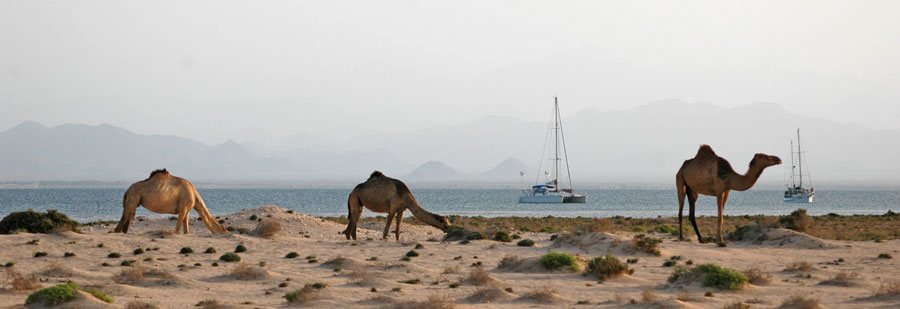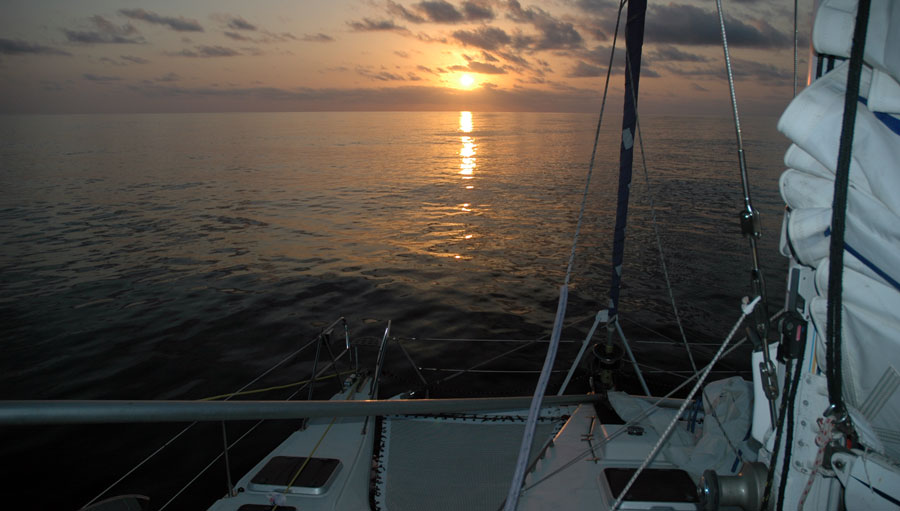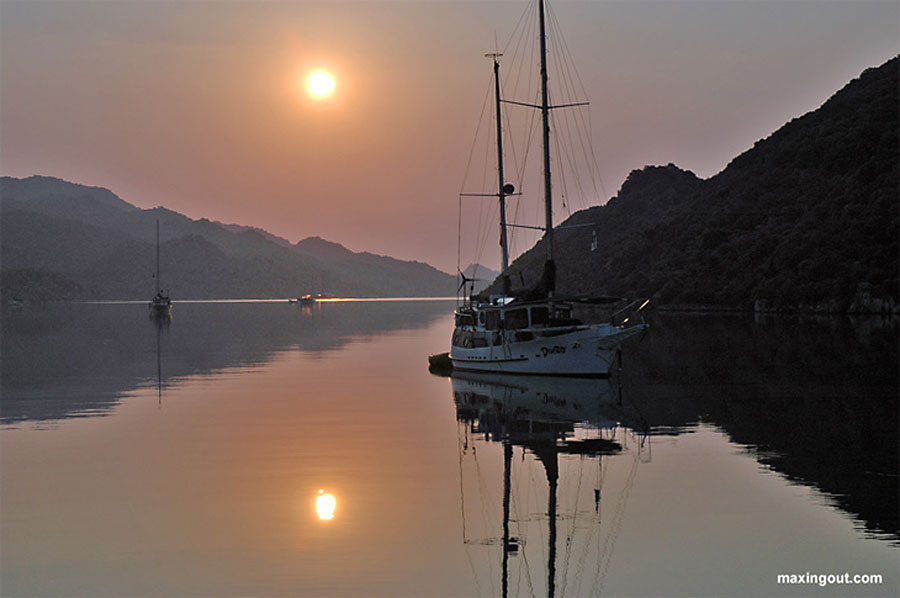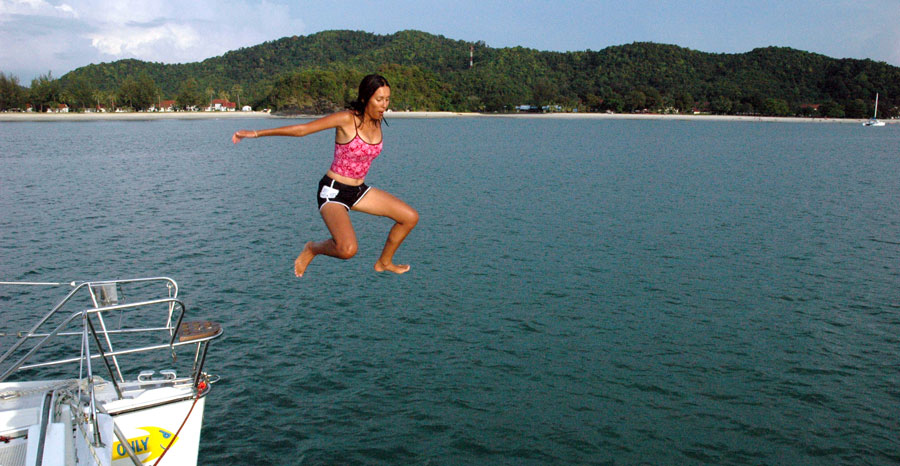EVERYWHERE, EVERYTHING
Where did they go?
Nowhere, everywhere.
What
did they accomplish?
Nothing, everything.
Arthur Beiser
I've
been sailing around the world for eleven years on Exit Only, and what a
trip it has been, full of agony and ecstasy, and everything in between.
I nearly died in a car accident in New Zealand, and I reckon that
qualifies as agony. In the ecstasy department, I sailed 33,000 miles
around the world, and have seen the things sailing dreams are made of.
So
where did we go? Some people would say nowhere, but I would say,
everywhere my heart desired, and everywhere I had the courage to point
the bows of my sturdy catamaran. It's all a matter of perspective.
If
you are a die hard city dweller living in New York, Paris, Rome, or
London, I suspect you would say nowhere. After all, we didn't go to a
single Broadway musical, or watch the new year change over in Times
Square on December thirty-first. We didn't walk down the Champs
D'Elysee, walk under the Arc de Triomphe, visit the Sorbonne, or munch
croissants at a sophisticated Paris cafe. We didn't go to the Vatican
or tour the Roman Coliseum. We didn't ride gondolas in Venice or view
the Leaning Tower of Pisa. We didn't see Buckingham Palace, ride the
tube, or visit the Millennium Dome on the River Thames. So there you
have it. Hard core city dwellers are right. We never went anywhere.
But
before you pity our pathetic plight or heap reproach upon our clueless
heads, let me tell you where we went. We went everywhere most city
dwellers never go.

We
sailed through the Panama Canal, and spent the night on Gatun Lake in
the land between the seas. We swam with the penguins, seals, and white
tip sharks in the Galapagos. We watched lizards eating cactus blossoms
and marine iguanas swimming along lava encrusted shores.
We sailed into Kontiki Land - the high volcanic Marquesas Islands - the
land of ancient Polynesian warriors, and we walked through the ruins of
their long abandoned villages. We swam beneath a waterfall that was
more than 1200 feet high, jumping off rocks into cool Polynesian pools.
We sailed the crystal clear lagoons of the Tuamotu Archipelagos,
exploring the motus of Apataki with its pearl farms scattered across the
lagoon.
We Med moored downtown on the Quay in Papeete and shopped in traditional
markets. We anchored in paradise in Moorea and hiked up to the
Belvedere. We visited Polynesian ruins in Raiatea and anchored in
Beautiful Taaha. We visited Michener's Bali Hai, Bora Bora, a Pacific
crown jewel and personal sailing mecca that proved I was living my
dreams. In Bora Bora we explored a tabu motu where "extraterrestials"
established a now defunct French new age cult.
We visited Suvarov atoll and met the family that watches over this
remote patch of paradise. We restocked our yacht in American Samoa and
then pointed our bows south to the Kingdom of Tonga. We visited my
favorite named island on planet earth - Malafakalava. We snorkeled
Mariner's Cave, and shopped in Niafu's narrow streets. We sat around
bonfires on the beach and made plans with other cruisers whether we
would sail south to New Zealand or west to Australia.
We dodged uncharted reefs and undersea volcanoes on route to Fiji, and
finally turned south to the land of the long white cloud, New Zealand.
We toured from the North Cape to Wellington, and rode the Lynx across
the tempestuous Cook Straits to the South Island of New Zealand. We
visited glaciers, mountains, drove down Skipper's Canyon and up the
Remarkables, and shot river rapids in jet boats. We visited
Christchurch with its Antarctic staging center and visited Milford Sound
in Fjord Land.
Next stop was New Caledonia and the Isle of Pines, a tiny Pacific
paradise with clear water and beautiful reefs. There were hikes in
Prony Bay where jumping Spanish mackerels land on your boat and into
your frying pan.
Next stop was Australia and the Great Barrier Reef with a ten thousand
kilometer side trip into the Ozzie outback. Then on to Brisbane,
Sydney, Cairns, Townsville, Lizard Island, Thursday Island and Darwin.
Next stop Bali and remote Borneo, traveling up remote rainforest rivers
to commune with wild orangutans in the jungle. We moved on to bustling
Singapore and the Malaysian paradise of Langkawi. We fed Eagles at the
hole in the wall on Langkawi's north shore and cruised among the immense
limestone pinnacles of Malaysia and Thailand. Next came Phi Phi Island
and Phuket in Thailand with a global tsunami that wreaked havoc in the
Indian Ocean.
Then came the Maldives in the middle of the Indian Ocean - a clear water
paradise, and the last outpost before entering the Gulf of Arabia.
Don't forget the adventures in Oman, Yemen, Eritrea, Sudan, and Egypt.
There was a Nile River cruise from Luxor to the High Aswan Dam visiting
the ruins of the pharos' domain. There were Pyramids in Giza and a two
day passage through the Suez Canal.

We made an overnight sail to Israel, running the Israeli Navy gauntlet.
We toured the ancient glory of Nimrod's fortress, the Holy Land, the
Dead Sea, and Mitzpah Ramon crater. Then we made a visit to Jordan's
Wadi Rum and Petra's hidden kingdom.
The voyage continued on to Cyprus and Turkey, land of Crusader castles,
Ephesus, Heriopolis, and waterfalls frozen in time at Pammukale. Next,
we sailed on to Greece, Italy, the Balearics, and Spain. Then we
explored the pillars of Hercules at Gibraltar, the staging ground for
our transatlantic adventure.
Next, we jumped off to the Canary and Cape Verde Islands, and across the
Atlantic to Barbados. Finally, there was the Caribbean with dozens of
unique destinations before crossing our outbound track in Fort
Lauderdale, eleven years after starting our global adventure.
Along the way we saw thousands of sunrises and sunsets, dozens of green
flashes, and we watched the Milky Way make it's nightly journey across
the sky. Orion, Taurus, and the Pliades were our constant companions as
we sailed on through our nights at sea. We breathed clean air and swam
in crystal clear waters for eleven years. Those were the best eleven
years of my life.
Perhaps die hard city dwellers are right. Maybe we never went anywhere
or accomplished anything. After all, we didn't visit New York, London,
Paris, or Rome.
I'll let you decide. Where did we go?
Nowhere or everywhere? What did we accomplish? Nothing or everything?

GO WEST YOUNG MAN - SEASTEADING
Go west young man, and seek your fortune
over the western horizon. Such was the call to 19th century pioneers in
North America. The government encouraged westward expansion by offering
homesteads - free parcels of land - to those brave souls who took up the
challenge.
Times are different now. All the land is taken, divided, and subdivided
thousands of times, and new homesteads are no more. All that remains
are millions of miles of fences and unfriendly walls. Postage stamp
size estates with no trespassing signs demarcate the homesteads of
yesteryear.
Nevertheless, the pioneer spirit survives in the hearts of those who
live in Water World. As we sail west around the world, we aren't in
search of land. We are seasteading.
What
is seasteading? Seasteading is a way of life in which homesteads don't
exist. You sail on the ocean of your dreams, and wherever you drop your
anchor becomes your temporary home - your seastead. The oceans and
waterways of the world constitute a massive aquatic seastead in which
you are free to roam at will. You may live in the same seastead for
weeks, months, or years, or you can change to a new one each day. Your
seastead may be anywhere from the tropics to the arctic circle -
wherever you have the courage to point the bow of your yacht.
People who seastead live in Water World. Their home is on the oceans
and seas that cover more than 70 percent of our planet. Water World is
a vast domain that transcends cultures, nationality, and politics.
Seasteaders are politically more neutral than the Swiss, and they come
from all the nations of the earth. Linguistic diversity and openness to
all religions and cultures are hallmarks of this transoceanic community.
Water World accommodates everyone. Our friends are German, French,
Canadian, American, Thai, Malay, Indonesian, Australian, New Zealanders,
Spanish - an endless ever changing list of seafarers who make seasteads
their home, and seasteading their way of life.
Most people who seastead aren't on vacation and aren't running from the
real world. They have bills to pay and must earn a living like everyone
else. The big difference is that in Water World, they don't have a
thirty year mortgage on the small patch of ocean where they anchor their
yacht. Their seastead belongs to no one and to everyone at the same
time. They have as much right to be on the seas or at anchor as anyone
else.
In his wisdom, God made plenty of water for everyone, and I'm glad He
did. Otherwise, there would be water wars. It wouldn't be long before
the governments of the world divided the ocean up into smaller and
smaller parcels, and seasteading would become a thing of the past.
Seasteading still is a viable way of life in most parts of the world.
There aren't enough of us sailing that it's worth the time and expense
for most governments to closely regulate us. But times are changing.
The industrialized nations of the west are constantly looking for new
sources of revenue, and if you remain too long in some European waters,
they will charge VAT on your boat. Fortunately, it's a big and
beautiful world out there with plenty of places for seasteaders to drop
their anchors and call home.
Seasteading is a great way of life. If you
purchase a small seaworthy yacht and save up your freedom chips, it
won't be long before you can start an awesome adventure. Your pioneer
spirit will well up within you as you hoist your sails and seek your
fortune over the western horizon.
Go west young man, go west.

TURKISH REFLECTIONS - SCOTTY, BEAM ME UP
Where are you Scotty? I need you to
beam me up!
Actually, I don't want you to beam me up. What I really want is for you
to beam up Exit Only and drop her off at Kekova Roads in Turkey. I'm
ready for some Turkish cruising. Turkey is the land of good people,
great hospitality, and outstanding cruising destinations.
We spent two months cruising Turkish waters, and that's far too short of
a time to discover all its wonders. Unlike many cruising destinations,
there are thousands of bays and inlets in which to anchor along its
craggy coast, and the anchorages are secure. The holding is usually
good, and that means you can get off your boat and take a hike or inland
trip without worrying about your anchor dragging.
While its true you have to take precautions and lock things up in the
big cities, out in the anchorages you don't have to worry about night
time boarders interested in your cash stash. The only people we know
who experienced skullduggery were med moored to quays in large towns
where you are easy prey to petty thievery. City thieves are slick
operators; when they're in stealth mode, they can clean you out in a
twinkling of an eye, and you won't know they were there until they're
long gone. But that's not unique to Turkey; that happens everywhere
around the world.
There are lots of ways to rate cruising destinations, and what's
important to a cruising sailor may mean little to a charterer who's more
interested in marinas and fancy meals at the end of the day. As far I'm
concerned, Turkey gets five stars. It has everything found in other
great destination and so much more.
Turkey is special because it's different. What sets Turkey apart and
makes it head and shoulders above the rest, is that Turkey is
interesting. Crusader castles and ancient Greek ruins abound. The
ruins of Greece found on the Greek mainland pale in comparison to those
found in Turkey. A day trip to Ephesus will blow you away. But you
don't need to drive inland to discover the wonders of ancient Turkey and
Greece. You can snorkel among sunken ruins all along the coast. If you
ever wondered where Atlantis was, look no further. It's lies in ruins
beneath the waters of the the Turkish Coast.
The crusaders had a special affinity for building castles in Turkey
overlooking the water. I suppose seaside castles made a lot of sense,
because supplying those fortresses by overland routes probably wouldn't
work in troubled times. Crusaders were invaders rather than invited
guests, and they had to bring much of their food and supplies with them
or do without. Bringing supplies in by sea was definitely the way to go
when other routes didn't work.
Although cruisers may like the Hard Rock Cafe, they don't like hard rock
anchorages. You'll hear nothing but complaints from cruisers about
anchorages that rock and roll. When they put their anchor down for the
night, they're looking for flat water. We may bounce around the world
when we sail offshore, but when we're at anchor, we don't want to rock
and roll. The picture at the top of this page shows a perfect anchorage
with a mirror like surface reflecting the setting sun. That's the stuff
that cruising dreams are made of, and it happens nearly every day in
Turkey.
Where are you Scotty? I'm still waiting to hear from you. It looks
like Scotty is not around, and I'm on my own. Oh well, at least I spent
two months living my Turkish dreams.
Life is good.
